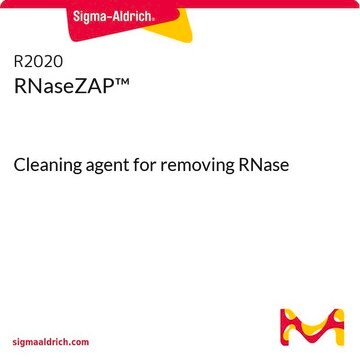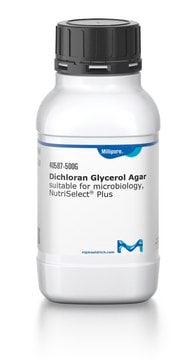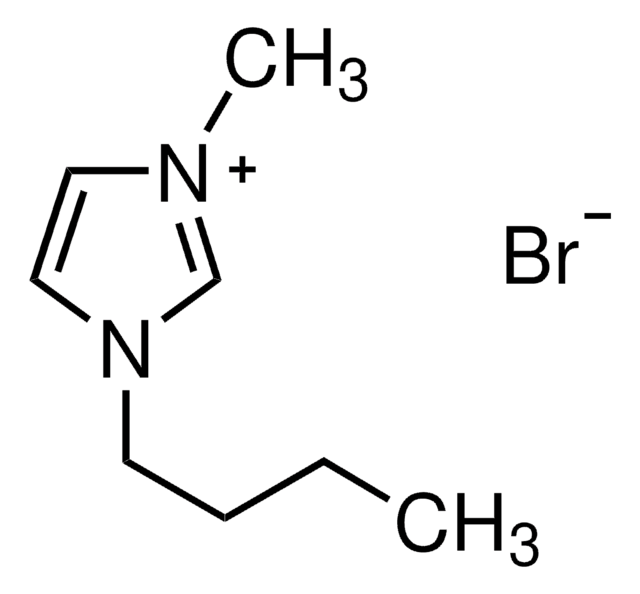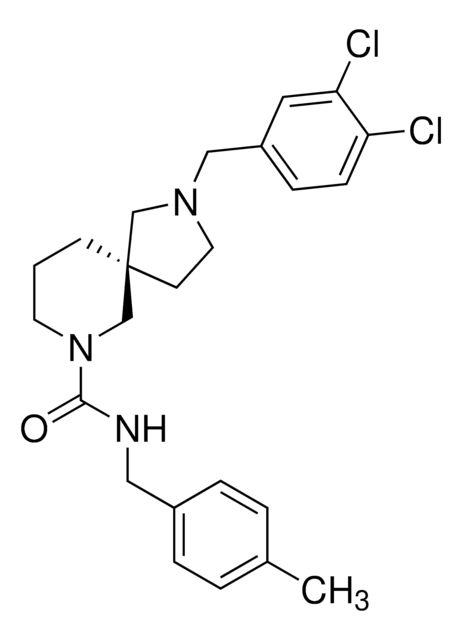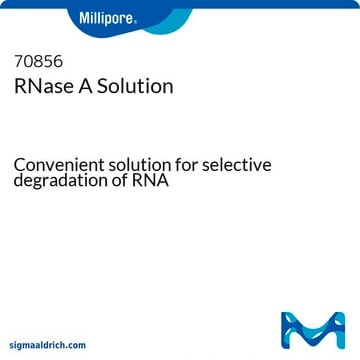83931
RNase AWAY®
decontamination reagent for RNase
Synonym(s):
Surface Decontaminant
Sign Into View Organizational & Contract Pricing
All Photos(1)
About This Item
Recommended Products
General description
RNase AWAY® is a ready-to-use surfactant that removes RNA and RNases from lab equipment. Suitable for PCR equipment, plastic, glassware, and stainless steel lab surfaces.
Application
RNase AWAY® has been used:
- in flow cytometry analysis
- to sterilize coated microstir bars for the formation of colloidal emulsion
- to remove RNAse from biosafety cabinet and lab equipment
- as a chemical to analyse the dynamic transcriptional and epigenetic remodeling during astrogliogenesis
Caution
Gloves should be worn when handling this product. RNase Decontamination Reagent is alkaline in nature and will cause irritation if prolonged contact with the skin is allowed. In case of contact with eyes, immediately flush with water for fifteen minutes and contact a physician. If swallowed, do not induce vomiting. Give plenty of water and contact a physician immediately.
Other Notes
Do not use RNase Decontamination Reagent on aluminium, soft metal or gaskets and seals. This product is not intended as reactant. Do not add to reaction.
Legal Information
AWAY is a registered trademark of Molecular BioProducts, Inc.
RNase AWAY is a registered trademark of Molecular Bio-Products, Inc.
related product
Product No.
Description
Pricing
Signal Word
Warning
Hazard Statements
Precautionary Statements
Hazard Classifications
Eye Irrit. 2 - Met. Corr. 1 - Skin Irrit. 2
Storage Class Code
8B - Non-combustible corrosive hazardous materials
WGK
nwg
Flash Point(F)
Not applicable
Flash Point(C)
Not applicable
Personal Protective Equipment
dust mask type N95 (US), Eyeshields, Gloves
Certificates of Analysis (COA)
Search for Certificates of Analysis (COA) by entering the products Lot/Batch Number. Lot and Batch Numbers can be found on a product’s label following the words ‘Lot’ or ‘Batch’.
Already Own This Product?
Find documentation for the products that you have recently purchased in the Document Library.
Customers Also Viewed
Mie Scatter and Interfacial Tension Based Real-Time Quantification of Colloidal Emulsion Nucleic Acid Amplification
Nicolini AM, et al.
Advanced Biosystems, 1(10), 1700098-1700098 (2017)
Stage-Specific Transcription Factors Drive Astrogliogenesis by Remodeling Gene Regulatory Landscapes
Tiwari N, et al.
Cell Stem Cell, 23(4), 557-571 (2018)
A CRISPR-Cas9 Genome Engineering Platform in Primary CD4+ T Cells for the Interrogation of HIV Host Factors
Hultquist JF, et al.
bioRxiv, 205500-205500 (2017)
[Importance of the clinico-radiologic diagnosis of cecal diverticulitis].
F Gimeno Solsona et al.
Revista espanola de enfermedades digestivas : organo oficial de la Sociedad Espanola de Patologia Digestiva, 77(2), 166-167 (1990-02-01)
Máire F Quigley et al.
Current protocols in immunology, Chapter 10, Unit10-Unit10 (2011-08-03)
A detailed knowledge of the principles that guide clonal selection within the memory and effector T cell pools is essential to further our understanding of the factors that influence effective T cell-mediated immunity and has direct implications for the rational
Our team of scientists has experience in all areas of research including Life Science, Material Science, Chemical Synthesis, Chromatography, Analytical and many others.
Contact Technical Service